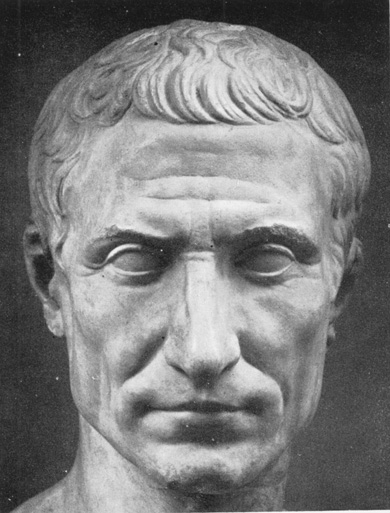
CASSIUS
But soft, I pray you. What, did Caesar swound?
CASCA
He fell down in the marketplace and foamed at the mouth and was speechless.
BRUTUS
'Tis very likely he hath the falling sickness.
- Julius Caesar, 1.2.256-259
Historians agree with Shakespeare: Caesar did indeed suffer from an illness that caused "swounding" (swooning/fainting). Shakespeare refers to it as the "falling sickness," which in the Elizabethan era was a term for epilepsy. However, a new study suggests that perhaps Caesar did not have epilepsy, but rather he suffered from a series of mini-strokes. Considering Caesar perished over 2,000 years ago, it's unlikely we will ever know for sure which condition he had. Therefore, read the articles below to devise your own informed opinion on what you think Caesar's "falling sickness" really was.
From the German Epilepsy Museum website:
http://www.epilepsiemuseum.de/alt/caesaren.html
The assumption that Caesar suffered from epilepsy is backed by several sources dating back to Roman times. For instance, Gaius Suetonius Tranquillus (Sueton, approx. 70-140 AD), the biographer of the first Roman emperor ('Vitae Caesarum'), reports that Caesar twice had epileptic seizures ('Defectio epileptica') while he was working. Appianus, the Roman historian from the second century AD, also mentions Caesar's 'epilepsy and sudden convulsions' in his description of the republican era. Plutarch states that Caesar had an epileptic seizure in the midst of the fighting during the Battle of Thapsus.
Caesar suffered this seizure two years before his death. At another point Plutarch also points out that Caesar did not have epileptic seizures until towards the end of his life.
The Roman authors already link Caesar's epilepsy to cerebral sclerosis, while others attribute it to alcohol. This would suggest that in ancient Rome a distinction was already being made between the 'genuine falling sickness' and a symptomatic type of epilepsy.
Ancient sources report that Julius Caesar (100-44 BC) had episodes of vertigo, dizziness and limb weakness.
The dictator of the Roman empire famously suffered falls during his campaigns in Spain and Africa. The first attack occurred in 46 BC in Thapsus, modern Tunisia, and the second in Cordoba, Spain, when he was over 50 years of age.
The Roman historian Suetonius (69-after 122 AD) claimed that “towards the end he was subject to sudden fainting fits and nightmares as well,” and called his disease “morbus comitialis.”
Caesar’s condition was also reported by the Greek historian Plutarch (about 46-120 AD). In his biography of the Roman general, he wrote that Caesar collapsed in Thapsus and was carried to safety to a “neighboring tower where he stayed quietly during the battle.”
Suetonius and Plutarch’s accounts contributed to produce a diagnosis of epilepsy which has prevailed for centuries.
“The theory that Caesar was epileptic appears not to have very solid philological foundations. If carefully re-examined, the facts appear to suggest a simpler and more logical diagnosis of stroke,” Francesco M. Galassi, an MD at Imperial College London, told Discovery News.
Detailing their review in the journal Neurological Sciences, Galassi and colleague Hutan Ashrafian, a surgeon at the college, argue that most studies have focused on the origin of Caesar’s epilepsy, but virtually none has questioned the assumption that he was epileptic.
“Suetonius uses the words ‘morbus comitialis’, a very general definition, not necessarily meaning epilepsy,” Galassi said.
According to Galassi and Ashrafian, the symptoms reported in Caesar’s life — falls, headache, vertigo, giddiness — are consistent with him having multiple mini-strokes.
“Furthermore, Caesar also suffered from other symptoms including depression and personality changes (exampled by emotional lability when listening to a moving oration by Cicero) which may also be consistent with cerebrovascular disease,” Galassi and Ashrafian wrote.
Another attack might have occurred when Caesar failed to stand up as senators honored him. On that occasion, he reported symptoms of headaches, vertigo and later mentioned giddiness and insensibility.
Considered one of the greatest military leaders of all time, Caesar first conquered territory in Britain, Gaul (now France), and Spain. He crossed Italy’s Rubicon River, giving rise to the five-year-long civil war that left him dictator of Rome.
By 45 BC, Caesar controlled a vast territory that later was the Roman Empire. But his rule was cut short when conspirators, who feared he had too much power, stabbed him to death in the Senate building.
Until now, cardiovascular explanations for Caesar condition have been largely ruled out because until his death he was apparently otherwise well in private and state affairs.
“Even if Caesar participated in an active lifestyle and may have benefited from the background of a Mediterranean diet, there is the added possibility of genetic predisposition towards cardiovascular disease,” the researchers wrote.
Indeed, Pliny the Elder reports that both Caesar’s father and another forefather died suddenly without any real explanation while putting on their shoes.
“This has been explained in terms of SUDEP (sudden unexpected death in epilepsy) but it is much more logical and less complicated to think of these deaths in terms of cerebrovascular disease or lethal myocardial infarction,” Galassi said.
There are no records of Caesar suffering from seizures in his youth and it is more rare to develop such attacks later in life.
The researchers concede that while epilepsy is a possibility, it would have to derive from adult onset diseases, such as head trauma, neurocystercosis from his Egyptian campaign,atherosclerosis, syphilis, malaria, tubercolosis and glioma.
At Caesar’s time, epilepsy was regarded as a divine disease. If not Caesar himself, his adoptive son and successor Octavian might have favored the story of the epilepsy in a propaganda drive.
“Had he suffered from epileptic attacks, in such a prominent individual like Ceasar no doubt we’d have many more detailed and informative descriptions than we happen to have,” Galassi concluded.
No comments:
Post a Comment